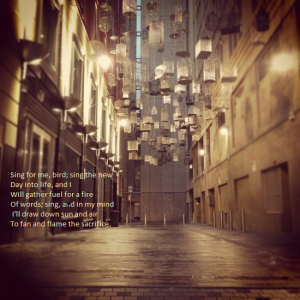Angel Place in Sydney is a back street that runs between the city’s two main shopping strips, George Street and Pitt Street. It’s at the prestigious end of town, tucked behind Martin Place, a swathe of light and space that cuts across four city blocks and creates an illusion of transparency at the heart of the city’s business district. The George/Pitt end of Martin Place has a particular gravitas that only money can buy: its stylish Victorian buildings, built to house the head offices of some of Australia’s oldest financial institutions, are home now to Macquarie Bank—a quintessentially modern, home-grown success story in global financial services—and a handful of jewellers and couturiers of the if-you-have-to-ask-the-price-you-can’t-afford-it variety. It doesn’t so much symbolise Australian capitalism as distil its essence. The other end of Martin Place, the Elizabeth Street end, stands at a slight elevation from which the functionally modern office block of the Reserve Bank of Australia can look down imperiously upon the money-grubbing mortals. Or so the semiotics of architecture and planning would suggest. You can stand at either end of Martin Place and be in no doubt as to which is the tonier. The Elizabeth Street end may look down on the George/Pitt end, but it does so in a physical sense only.
Anyway, back to Angel Place: it hosts the City Recital Hall, which is noted for its brilliant acoustics, and two or three good restaurants. These, and the proximity to Martin Place, give the little lane the appeal of genteel bohemianism. There’s something else, too. Like all such streets—sequestered from the white noise of the city, below the tall indifferent backs of city blocks—Angel Place has its own sonic ambiance, a sort of muffled echoing peacefulness. That’s the first thing you notice as you enter; the second thing is also a sound—an astonishing variety of bird song drizzling down through the silence. Looking up, you see the cages.
This is a clever, beautiful and thought-provoking art installation—Forgotten Songs, by Michael Thomas Hill—in which every (empty) cage and recorded song represents a bird once common in what is now Sydney but no longer found there, forced out by European settlement (short video here). I was prompted to write about it when I came across this stunning photograph, taken by—who knows? Google Images isn’t terribly helpful on authorship and copyright, so if anyone reads this and has the answer, please let me know. I’ve added a few lines of my own to the pic which, though conceived independently of Hill’s excellent artwork, work for me as a kind of ironic (but reinforcing) counterpoint to his theme. Worth a visit if you’re in Sydney.


